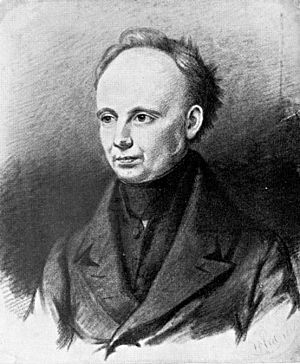Christian Dietrich Grabbe facts for kids
Quick facts for kids
Christian Dietrich Grabbe
|
|
|---|---|

Lithograph, 1836
|
|
| Born | 11 December 1801 Detmold, Principality of Lippe |
| Died | 12 September 1836 Detmold |
| Occupation | Playwright |
| Nationality | German |
| Notable works | Scherz, Satire, Ironie und tiefere Bedeutung, Don Juan und Faust, Die Hohenstauffen, Die Hermannsschlacht |
Christian Dietrich Grabbe (born December 11, 1801 – died September 12, 1836) was an important German playwright. He lived during a time in Germany called the Vormärz era. Grabbe wrote many historical plays. These plays often showed a world that seemed difficult and sometimes sad.
A famous writer, Heinrich Heine, thought Grabbe was one of Germany's best playwrights. He called him "an original Shakespeare". Another famous thinker, Sigmund Freud, also described Grabbe as "an original and rather peculiar poet."
Contents
Early Life and Education
Christian Dietrich Grabbe was born in Detmold, Germany. He started writing plays when he was just sixteen years old. At that time, he was attending a school called a Gymnasium.
He received a special scholarship from Princess Pauline. This scholarship allowed him to study law. He went to universities in Leipzig and Berlin. While studying in Berlin, he met the famous writer Heinrich Heine.
Career and Later Years
After finishing his studies in 1823, Grabbe tried to become a theater director. However, he was not successful. He then went back to Detmold. He passed his final law exams there. He tried to find work as a legal officer, but again, he had no luck.
In 1826, he finally got a job. He became a legal advisor for the military. At first, he did not get paid for this work. In 1833, Grabbe married Louise Christina Clostermeier. The next year, he left his job and moved to Frankfurt. He later moved to Düsseldorf. There, he worked for a short time at the Altes Theater. He worked with another playwright named Karl Leberecht Immermann.
Grabbe returned to Detmold in 1836. He passed away in the same year.
Grabbe's Lasting Impact
Christian Dietrich Grabbe was one of the most important German playwrights of his time. Another key writer was Georg Büchner. Grabbe's first play, Herzog Theodor von Gothland, was very intense. It was difficult for critics to understand at the time.
His plays were influenced by William Shakespeare and the Sturm und Drang movement. This was a period in German literature. Grabbe's plays were very ambitious. They often had large crowd scenes. They also had quick scene changes. This made them hard for theaters to perform back then.
Grabbe changed the strict rules of classical drama. He used a series of loose scenes. This style was an early form of realist drama. His plays like Napoleon oder Die hundert Tage and Hannibal showed history in a very real way.
After he died, people forgot about his work for a while. But later, playwrights from the Naturalist and Expressionist movements rediscovered his plays. Today, his work is still studied and performed.
Recognizing Grabbe's Contributions
The city of Detmold honors Christian Dietrich Grabbe. Since 1994, they have given out the Christian-Dietrich-Grabbe Prize. This award is for new dramatic literature. It is given with the Grabbe-Gesellschaft literary society. It is also supported by the Landesverband Lippe municipal association.
Notable Works
- Herzog Theodor von Gothland, a tragedy (1822)
- Scherz, Satire, Ironie und tiefere Bedeutung, a comedy (1822/27)
- Don Juan und Faust, a tragedy (1828)
- Kaiser Friedrich Barbarossa, a drama (1829)
- Kaiser Heinrich VI., a drama (1829)
- Napoleon oder Die hundert Tage, a drama (1831)
- Hannibal, a tragedy (1835)
- Die Hermannsschlacht, a drama (1835–36)
Images for kids
See also
 In Spanish: Christian Dietrich Grabbe para niños
In Spanish: Christian Dietrich Grabbe para niños
 | Jessica Watkins |
 | Robert Henry Lawrence Jr. |
 | Mae Jemison |
 | Sian Proctor |
 | Guion Bluford |


